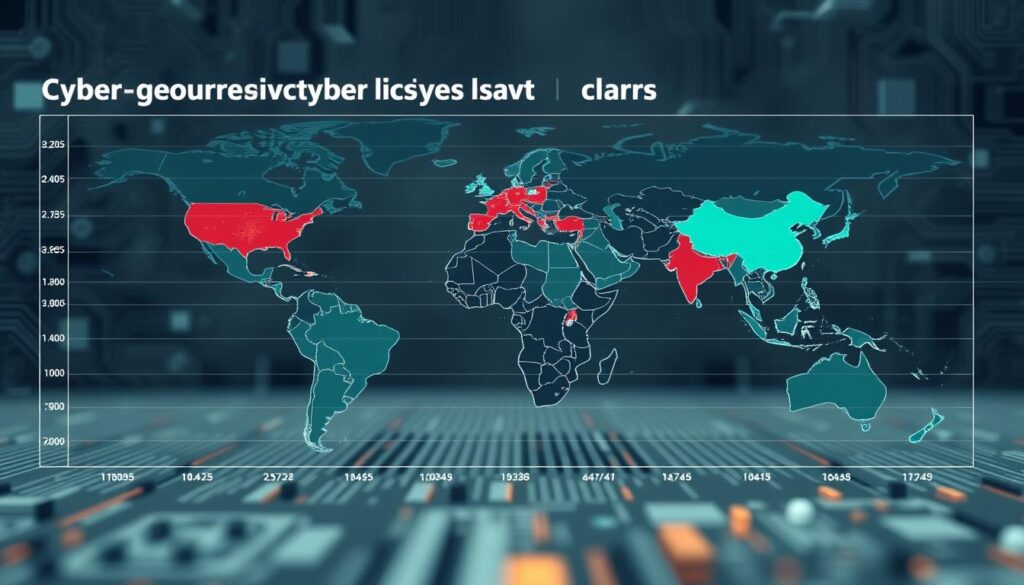The demand for skilled cybersecurity professionals is skyrocketing, with cybersecurity jobs expected to grow 31 percent by 2029—more than seven times the average rate of job growth across all industries.
As our digital world continues to expand, the need for robust security measures has never been more critical. This growth translates into attractive salaries for those in the field, making cybersecurity careers among the most lucrative in the tech industry today.
The increasing demand has created a significant skills gap, with over 4 million professionals needed worldwide. Factors such as experience, education, and industry play a crucial role in determining salary ranges for these roles.
Key Takeaways
- Discover the most lucrative cybersecurity careers and their corresponding salaries.
- Understand the factors influencing cybersecurity salary ranges.
- Learn about the growing demand for cybersecurity professionals and the skills gap.
- Explore the responsibilities and required skills for high-paying cybersecurity roles.
- Gain insights into why organizations pay premium salaries for qualified cybersecurity professionals.
The Growing Demand for Cybersecurity Professionals
As technology advances, the demand for cybersecurity professionals continues to skyrocket. The increasing reliance on digital technologies has made cybersecurity a top priority for organizations across various industries.
The Importance of Cybersecurity in Today’s Digital Landscape
In today’s digital age, cybersecurity plays a crucial role in protecting sensitive information and preventing cyber attacks. The importance of cybersecurity cannot be overstated, as organizations face an ever-evolving landscape of threats.
Cybersecurity is essential for safeguarding digital assets, maintaining customer trust, and ensuring business continuity. As technology continues to evolve, the need for robust cybersecurity measures becomes increasingly important.
Why Cybersecurity Careers Are Well-Compensated
Cybersecurity careers are well-compensated due to the high demand for skilled professionals and the critical nature of the work involved. According to the U.S. Bureau of Labor Statistics (BLS), the median pay for an information security analyst is just over $103,000.
Several factors contribute to the high salaries in cybersecurity:
- The severe shortage of qualified cybersecurity professionals has created a competitive job market.
- Organizations understand that the cost of a security breach far exceeds the investment in skilled cybersecurity personnel.
- The specialized knowledge and continuous learning required in cybersecurity justify higher compensation.
As you gain experience and develop specialized skills in cybersecurity, your expertise becomes more valuable, leading to salary growth throughout your career.
Why Consider a Career in Cybersecurity

You can make a significant impact in the world by choosing a career in cybersecurity. As a cybersecurity professional, you will be working to protect people’s sensitive data and maybe even their lives. This field offers a unique blend of challenge and reward, making it an attractive career option for many.
High Demand and Job Security
The demand for cybersecurity professionals is on the rise, driven by the increasing need to secure systems and protect information. This high demand translates to job security, as companies are looking for skilled professionals to fill these critical roles.
Competitive Compensation
Cybersecurity careers are well-compensated, reflecting the importance and complexity of the role. Professionals in this field can expect competitive salaries and benefits, making it a financially rewarding choice.
Making a Tangible Impact
Your work in cybersecurity has real-world implications. You’ll be on the front lines defending critical infrastructure, healthcare systems, financial networks, and other essential services from malicious actors. By applying your knowledge and developing effective solutions, you’ll contribute to maintaining public trust in digital systems that have become fundamental to modern society.
- You’ll experience the satisfaction of directly protecting people’s sensitive data, financial assets, and sometimes even their physical safety.
- Your work has real-world implications, as seen in cases like the FDA recall of vulnerable pacemakers.
- You’ll be defending critical infrastructure and essential services from malicious actors.
Factors Influencing Cybersecurity Salaries

Cybersecurity salaries are influenced by a multitude of factors, each playing a significant role in determining your overall compensation. Understanding these elements can help you make informed decisions about your career path and potential earnings.
Experience and Expertise
Your level of experience and expertise significantly impacts your cybersecurity salary. As you accumulate years of experience and develop specialized skills, your earning potential increases. Professionals with a strong track record in cybersecurity are in high demand, commanding higher salaries.
Education and Certifications
Education and certifications also play a crucial role in determining your salary. Advanced degrees and relevant certifications can significantly boost your earning potential. Certifications like CISSP or CISM are highly valued in the industry, demonstrating your expertise and commitment to staying up-to-date with the latest security practices.
Industry and Company Size
The industry you work in and the size of your company can also affect your salary. Certain sectors, such as finance and government, tend to offer higher salaries due to the sensitive nature of their data. Larger companies often have more resources to devote to cybersecurity, potentially leading to higher compensation.
Geographic Location
Your geographic location significantly impacts your cybersecurity salary. Major tech hubs like San Francisco, New York, and Washington D.C. offer the highest compensation, often to offset the higher cost of living. You’ll find that cybersecurity salaries in metropolitan areas can be 20-40% higher than in rural areas. The Washington D.C. metro area consistently ranks as one of the highest-paying regions due to the concentration of federal agencies and contractors. With the rise of remote work, location may become less influential, but currently, it remains a key factor in determining your salary.
The 10 Highest-Paid Cybersecurity Jobs and Their Salaries
As you explore the world of cybersecurity, you’ll discover a range of high-paying job opportunities. The field is rapidly evolving, with new threats and technologies emerging constantly. This has led to a high demand for skilled cybersecurity professionals who can protect networks, systems, and data from various cyber threats.
1. Chief Information Security Officer (CISO)
The Chief Information Security Officer (CISO) is a senior-level executive responsible for developing and implementing an organization’s overall cybersecurity strategy. This role involves overseeing the protection of an organization’s digital assets and ensuring compliance with regulatory requirements.
Responsibilities and Salary Range
A CISO’s responsibilities include developing cybersecurity policies, managing incident response, and overseeing security operations. The salary range for a CISO can vary widely based on factors like organization size and industry, but typically falls between $150,000 and $250,000 per year.
Skills and Qualifications Needed
To become a CISO, you’ll need extensive experience in cybersecurity, strong leadership skills, and excellent communication abilities. A bachelor’s degree in a relevant field and certifications like CISSP or CISM are often required.
2. Security Architect
A Security Architect designs and implements secure computer systems and networks. This role involves identifying potential security risks and developing strategies to mitigate them.
Responsibilities and Salary Range
Security Architects are responsible for designing secure architectures, implementing security measures, and ensuring compliance with security standards. Their salary range typically falls between $120,000 and $200,000 per year.
Skills and Qualifications Needed
To be a successful Security Architect, you’ll need a strong background in computer systems and networks, knowledge of security frameworks, and experience with risk management. Certifications like CISSP or CSSLP can be beneficial.
3. Information Systems Security Manager
An Information Systems Security Manager oversees the implementation of security measures to protect an organization’s information systems. This role involves managing security teams and ensuring compliance with security policies.
Responsibilities and Salary Range
The responsibilities include managing security operations, developing security policies, and conducting risk assessments. The salary range for this role typically falls between $100,000 and $180,000 per year.
Skills and Qualifications Needed
You’ll need strong leadership and management skills, a good understanding of security principles, and experience in managing security teams. A bachelor’s degree in a relevant field and certifications like CISM can be advantageous.
4. Network Security Engineer
A Network Security Engineer is responsible for designing and implementing secure network infrastructures. This involves configuring firewalls, managing VPNs, and ensuring network security.
Responsibilities and Salary Range
Their responsibilities include designing secure network architectures, implementing security measures, and troubleshooting network issues. The salary range for Network Security Engineers typically falls between $90,000 and $160,000 per year.
Skills and Qualifications Needed
You’ll need a strong understanding of network protocols, experience with security technologies like firewalls and VPNs, and knowledge of network architecture. Certifications like CCNP Security can be beneficial.
5. Application Security Engineer
An Application Security Engineer focuses on securing software applications by identifying and mitigating vulnerabilities. This role involves collaborating with development teams to ensure secure coding practices.
Responsibilities and Salary Range
The responsibilities include conducting security assessments, implementing secure coding practices, and managing application security testing. The salary range for Application Security Engineers typically falls between $100,000 and $170,000 per year.
Skills and Qualifications Needed
You’ll need a strong background in software development, knowledge of secure coding practices, and experience with application security testing tools. Certifications like CSSLP or CEH can be advantageous.
6. Penetration Tester
A Penetration Tester simulates cyber attacks on an organization’s computer systems to identify vulnerabilities. This role involves testing defenses and providing recommendations for improvement.
Responsibilities and Salary Range
The responsibilities include conducting penetration tests, identifying vulnerabilities, and providing remediation advice. The salary range for Penetration Testers typically falls between $80,000 and $150,000 per year.
Skills and Qualifications Needed
You’ll need a strong understanding of hacking techniques, experience with penetration testing tools, and knowledge of security frameworks. Certifications like OSCP or CEH are often required.
7. Information Security Analyst
An Information Security Analyst monitors and analyzes an organization’s security posture to identify potential threats. This role involves developing strategies to mitigate risks.
Responsibilities and Salary Range
The responsibilities include monitoring security systems, analyzing threats, and implementing security measures. The salary range for Information Security Analysts typically falls between $70,000 and $140,000 per year.
Skills and Qualifications Needed
You’ll need a good understanding of security principles, experience with security information and event management (SIEM) systems, and knowledge of threat analysis. Certifications like CompTIA Security+ can be beneficial.
8. Malware Analyst
A Malware Analyst analyzes and mitigates malware threats to an organization’s computer systems. This involves understanding malware behavior and developing strategies to counter it.
Responsibilities and Salary Range
The responsibilities include analyzing malware samples, developing mitigation strategies, and collaborating with other security teams. The salary range for Malware Analysts typically falls between $80,000 and $150,000 per year.
Skills and Qualifications Needed
You’ll need a strong understanding of malware analysis techniques, experience with reverse engineering tools, and knowledge of operating systems. Certifications like GREM or CISSP can be advantageous.
9. Security Consultant
A Security Consultant provides expert advice to organizations on improving their cybersecurity posture. This role involves assessing security risks and recommending mitigation strategies.
Responsibilities and Salary Range
The responsibilities include conducting security assessments, providing consulting services, and developing security plans. The salary range for Security Consultants typically falls between $80,000 and $160,000 per year.
Skills and Qualifications Needed
You’ll need a strong background in cybersecurity, excellent communication skills, and experience in security consulting. Certifications like CISSP or CISM can be beneficial.
10. Cloud Security Engineer
A Cloud Security Engineer is responsible for securing an organization’s cloud infrastructure and services. This involves implementing security measures and ensuring compliance with cloud security standards.
Responsibilities and Salary Range
The responsibilities include designing secure cloud architectures, implementing cloud security controls, and monitoring cloud security. The salary range for Cloud Security Engineers typically falls between $120,000 and $200,000 per year.
Skills and Qualifications Needed
To excel in this role, you’ll need proficiency in major cloud platforms like AWS, Azure, or Google Cloud, including their native security services and features. Your understanding of cloud network security, including virtual private clouds, security groups, and network access controls, will be essential. You should develop expertise in cloud identity and access management to implement the principle of least privilege in cloud environments. Your knowledge of data encryption techniques and key management in the cloud will be crucial for protecting sensitive information. You’ll need familiarity with cloud-specific compliance standards and governance frameworks relevant to your industry. Your automation skills will help you implement security as code and integrate security into DevOps pipelines. Certifications like AWS Certified Security Specialty, Microsoft Certified: Azure Security Engineer Associate, or CCSP (Certified Cloud Security Professional) can demonstrate your cloud security expertise.
Essential Cybersecurity Certifications

As you navigate the cybersecurity landscape, obtaining the right certifications can be a game-changer for your career. Cybersecurity certifications are designed to validate your knowledge and skills, making you a more competitive candidate in the job market.
The cybersecurity industry offers a range of certifications catering to different levels of experience and expertise. Whether you’re just starting out or are a seasoned professional, there’s a certification that can help you achieve your career goals.
Entry-Level Certifications
Entry-level certifications are perfect for those new to the cybersecurity field. These certifications provide a foundation in security principles and practices. CompTIA Security+ is a popular entry-level certification that covers a broad range of security topics.
Mid-Level Certifications
Mid-level certifications are designed for professionals with some experience in cybersecurity. These certifications demonstrate a deeper understanding of security concepts and practices. Certified Information Systems Security Professional (CISSP) is a well-respected mid-level certification that covers a wide range of security domains.
Advanced Certifications
Advanced certifications are for experienced cybersecurity professionals looking to demonstrate expert-level knowledge and skills. Some of the most prestigious advanced certifications include:
- Certified Information Systems Security Professional (CISSP) with concentrations
- Certified Information Security Manager (CISM)
- GIAC Security Expert (GSE)
- Offensive Security Certified Expert (OSCE)
- Certified Information Systems Auditor (CISA)
These advanced certifications often require significant experience and are highly respected in the industry. They demonstrate expert-level knowledge in specialized domains and can significantly boost your earning potential.
How to Build a Successful Career in Cybersecurity
Building a successful career in cybersecurity requires a strategic approach. You need to develop a combination of technical skills, practical experience, and professional connections to excel in this field.
Develop Key Technical Skills
To succeed in cybersecurity, you need to have a strong foundation in technical skills such as network security, threat analysis, and incident response. You should focus on acquiring skills that are in high demand, such as cloud security, artificial intelligence, and machine learning. Key technical skills are essential for a successful cybersecurity career.
Gain Practical Experience
Gaining practical experience is crucial in cybersecurity, as it allows you to apply theoretical knowledge to real-world problems. You can gain experience through internships, entry-level positions, or by participating in bug bounty programs and hackathons. Practical experience is vital for developing problem-solving skills and staying up-to-date with emerging threats.
Network with Industry Professionals
Networking with industry professionals is a critical aspect of building a successful cybersecurity career. You can connect with professionals through attending conferences, meetups, and online forums. You should also consider joining professional organizations such as ISACA, (ISC)², or OWASP to expand your network. Networking can provide valuable insights, mentorship, and job opportunities.
Some ways to network with industry professionals include:
- Attending cybersecurity conferences and meetups
- Participating in online forums and discussions
- Joining professional organizations such as ISACA, (ISC)², or OWASP
- Engaging with the cybersecurity community on platforms like LinkedIn and Twitter
Conclusion
As you consider a career in cybersecurity, you’re not just looking at a job; you’re stepping into a world where your skills can make a real difference. You’ve explored the 10 highest-paid cybersecurity jobs and their impressive salaries, from the Chief Information Security Officer (CISO) to specialized roles like Cloud Security Engineer and Penetration Tester.
Your understanding of the factors influencing cybersecurity salaries, including experience, education, industry, and location, can help you plan your career path strategically. With the growing demand for cybersecurity professionals, you can be confident in the long-term job security and growth potential in this field.
By developing key technical skills, gaining practical experience, and networking with industry professionals, you’re well on your way to a successful cybersecurity career. This career isn’t just financially rewarding; it also offers the satisfaction of protecting organizations and individuals from digital threats, making a tangible impact on our increasingly tech-dependent world.
FAQ
What are the most in-demand cybersecurity roles?
The most in-demand cybersecurity roles include Security Engineers, Information Security Analysts, and Network Security Engineers, as companies seek to protect their networks and systems from cyber threats.
How much can I earn as a cybersecurity professional?
Salaries for cybersecurity professionals vary based on factors like experience, education, and location, but top roles like Chief Information Security Officer (CISO) and Security Architect can command six-figure salaries.
What skills are required for a career in cybersecurity?
Key skills for a career in cybersecurity include knowledge of network security, application security, and threat analysis, as well as certifications like CompTIA Security+ or CISSP.
How can I get started in a cybersecurity career?
To get started in cybersecurity, you can develop key technical skills, gain practical experience through internships or entry-level positions, and network with industry professionals.
What certifications are most valuable in cybersecurity?
Valuable certifications in cybersecurity include CompTIA Security+, CISSP, and CEH, which demonstrate expertise and commitment to the field.
How does industry and company size impact cybersecurity salaries?
Industry and company size can significantly impact cybersecurity salaries, with larger companies and industries like finance and healthcare often offering higher salaries.
What is the role of a Security Engineer?
A Security Engineer designs and implements secure systems and networks, using their knowledge of security protocols and technologies to protect against cyber threats.
